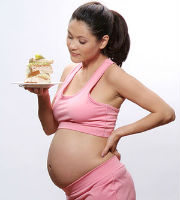Morning Sickness or Pregnancy-Induced Nausea (PIN)
Yes, that feeling that you’ve been hearing about and dreading may have started by now. The term “morning sickness” is misleading, as this queasiness can occur in the morning, afternoon, evening, or middle of the night. Instead of calling it morning sickness, in our practices, we refer to it as pregnancy-induced nausea (PIN). The intensity and duration of PIN is as individual as a mother’s weight gain. For most women, it seems to peak at four to seven weeks.
20 Foods to Help with Morning Sickness
There are many ways to ease your morning sickness, and choosing the right foods to eat is one of the easiest solutions. It is important to choose foods that are easier for your stomach to digest, while being aware of how your body tends to react to different meals. This list of foods for morning sickness should help settle your pregnant stomach.

- Applesauce
- Bagels
- California Avocado
- Cereal
- Chewing gum
- Frozen yogurt
- Ginger, available as root extract, fresh ground, capsules, tea, sticks, crystals, or snaps
- Grapes
- Lemon drops
- Lemons, for sucking on or sniffing
- Mints, peppermint
- Oatmeal
- Potato chips
- Potatoes (baked, boiled, mashed)
- Puddings
- Raspberry leaf tea
- Rice cakes
- Soda crackers
- Sorbet, sherbet
- Yogurt smoothies
Avoid Foods That Make Morning Sickness Worse
Your stomach is extra sensitive during pregnancy so try to avoid foods that will aggravate it even more. Most fatty, greasy, fried or other generally unhealthy foods are not going to help settle your stomach, so keep these foods that make morning sickness worse out of your diet.

- Cabbage
- Cauliflower
- Coffee and cola
- Foods containing monosodium glutamate (MSG)
- Fried eggs
- Fried foods
- Greasy foods
- High-fat foods
- Onions
- Sauerkraut
- Sausages

